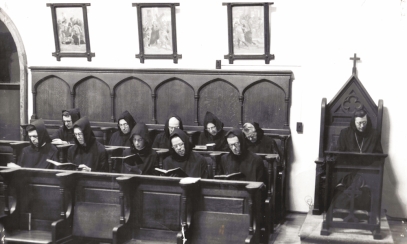
‘Why can’t I feel free after confession?
Why can’t I feel the grace of God anymore?’
Why can’t I feel the grace of God anymore?’
In the Garden of Eden, before the Fall, Adam and Eve had perfect possession of their emotions, of their feelings. For example, when Adam needed to eat, he felt hungry; when he did not need to eat, he felt full. His feelings always corresponded to reality. Before they sinned, Adam and Eve only felt things that were real. In paradise, their bodies, their souls, and creation around them were in perfect harmony.
In the Garden of Eden, before the Fall, Adam and Eve had perfect possession of their emotions, of their feelings. For example, when Adam needed to eat, he felt hungry; when he did not need to eat, he felt full. His feelings always corresponded to reality. Before they sinned, Adam and Eve only felt things that were real. In paradise, their bodies, their souls, and creation around them were in perfect harmony.
After the Fall, when Adam and Eve disobeyed God, the unity which they once experienced broke down. Because Adam and Eve rebelled against the natural order, they chose not to participate in the harmony of creation which God had made. And so, their bodies and their souls were not perfectly synced-up anymore. We call the symptoms of that disruption the effects of original sin.
Those effects of original sin are still present in us today. For example, sometimes we have a desire to eat even though we’re not actually hungry. Or, we get angry at something that shouldn’t make us angry, or we don’t get angry at something that we should be angry about. Now, because of original sin, our feelings don’t always correspond to reality. Our emotions don’t consistently reflect the way that things really are.
Before the Fall, Adam and Eve were able to speak with God in a very direct way. After the Fall, their communication with God was clouded. That’s also true of our relationship with God. Even though God is always present to us, always sustaining us in being, we often don’t recognize it, much less feel it. You would not be alive at this very moment if God were not loving you, holding you, creating you. And yet, for the most part, we’re not even aware of that profound love and care of God. Just because we don’t feel it doesn’t mean it’s not there. Just because we close our eyes does not mean that the sun ceases to shine. Lots of things exist in the world without us feeling them, most especially God’s presence.
When we go to confession, receive the sacraments, pray, or spend time in the Lord’s presence, we’re receiving the grace of God. We know that because the Lord Himself promises to be present to us when we call out to Him; Jesus promises to send us the Holy Spirit as our consoler and guide. Even though we know the truth of God’s presence in our intellect, we don’t always feel it. Our emotions don’t always correspond to divine reality. The same is true of confession: sometimes we feel the grace of forgiveness, and sometimes we don’t have a strong feeling. Regardless, we know that we are forgiven.
When we do feel the grace of God, we can firstly thank God for that gift. We certainly don’t have any right to feel God’s presence, yet He gives those feelings to us anyway. Those feelings of consolation from God are a gift. Secondly, we can ask God to be more aware of His presence and to “feel the workings of His mercy” (as the Collect for the 24th Sunday of Ordinary Time says). With God’s help, we can hone our skills to see Him, to listen to Him in our daily life. After a while, and with His grace supporting us, we become more and more aware of God’s presence — in our spirit, in our mind, in our body.
Father Paschal Pautler, O.S.B., is a monk and priest of St. Bernard Abbey in Cullman. Hailing from Birmingham, Father Paschal was educated by the Nashville Dominican Sisters at St. Rose Academy and then by the Monks of St. Bernard Abbey at St. Bernard Preparatory School. After graduation from high school, he entered the monastery. He was ordained a priest in 2023, and he presently serves as the Development Director for St. Bernard Abbey and Preparatory School.



